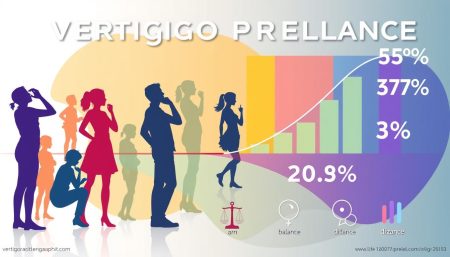Vertigo can make your world spin. It affects millions, making them wonder how long it lasts and how to get better. Knowing the symptoms timeline is crucial for managing vertigo.
Vertigo episodes can be short or last for days. The recovery time depends on the cause and treatment. Understanding what to expect can help you deal with the dizziness and find your balance again.
In this guide, we’ll look at typical vertigo duration, symptoms, and what affects recovery time. Whether you’re facing a short episode or a long-term issue, we’ll help you stay balanced.
Understanding Vertigo: Definition and Basic Concepts
Vertigo is when you feel like you’re spinning, even when you’re not moving. It’s different from regular dizziness because it makes you think your world is spinning around you. This can make it hard to balance and do everyday things.
The inner ear is key for keeping your balance. If it gets disrupted, you might feel vertigo. Symptoms can include:
- Nausea
- Vomiting
- Balance problems
- Headaches
- Sweating
Knowing how long does vertigo last is important. It can be short, lasting just seconds, or it can go on for days.
Vertigo can be caused by a few things:
| Cause | Description |
|---|---|
| BPPV | Benign Paroxysmal Positional Vertigo, caused by inner ear crystal displacement |
| Meniere’s Disease | Inner ear disorder causing vertigo, hearing loss, and tinnitus |
| Vestibular Neuritis | Inflammation of the vestibular nerve, often due to viral infections |
If you’re dealing with vertigo symptoms that won’t go away, see a doctor. They can figure out what’s causing it and help you manage it.
“Vertigo is not just feeling dizzy; it’s a specific sensation of movement that can significantly impact one’s quality of life.”
How Long Does Vertigo Last: Duration Patterns and Variables
Vertigo episodes can last from a few seconds to hours or even days. Knowing these patterns is key to managing symptoms and finding the right treatment.
Acute Vertigo Episodes Timeline
Acute vertigo attacks usually last from a few seconds to several hours. The exact time depends on the cause. For example, BPPV episodes might end in just a minute. But vestibular neuritis can last for days.

Chronic Vertigo Duration Patterns
Chronic vertigo, like Meniere’s disease, can cause episodes that last 20 minutes to hours. These episodes often follow a pattern, with breaks in between.
Factors Affecting Vertigo Duration
Several things can change how long vertigo lasts:
- Underlying cause
- Individual health conditions
- Treatment effectiveness
- Lifestyle factors
| Vertigo Type | Typical Duration | Frequency |
|---|---|---|
| BPPV | Seconds to minutes | Multiple times daily |
| Vestibular Neuritis | Days to weeks | Single episode |
| Meniere’s Disease | 20 minutes to hours | Variable, recurring |
Understanding these patterns is crucial for creating a treatment plan. It’s also important to talk to a healthcare professional for a proper diagnosis and management strategy.
Common Types of Vertigo and Their Typical Duration
Vertigo has many forms, each with its own traits and how long it lasts. Knowing these types helps you manage symptoms and find the right treatment. Let’s look at three common vertigo types and how long they usually last.
BPPV (Benign Paroxysmal Positional Vertigo)
BPPV is the most common vertigo. It makes you feel dizzy briefly when you move your head. These dizzy spells usually last under a minute but can feel very intense. Most BPPV cases get better in a few weeks or months.
Vestibular Neuritis Duration
Vestibular neuritis is an inner ear problem that causes constant, severe vertigo. The first attack can last days, with symptoms slowly getting better over weeks. Vertigo from this condition can last up to six weeks. Some people may still feel effects for months.
Meniere’s Disease Episodes
Meniere’s disease leads to vertigo attacks, hearing loss, and tinnitus. These vertigo episodes can last from 20 minutes to hours. How often these episodes happen varies a lot, from several times a week to once a year.
| Type of Vertigo | Typical Episode Duration | Overall Duration |
|---|---|---|
| BPPV | Less than 1 minute | Weeks to months |
| Vestibular Neuritis | Several days (initial attack) | Up to 6 weeks |
| Meniere’s Disease | 20 minutes to several hours | Lifelong, with varying frequency |
Recognizing Early Warning Signs of a Vertigo Episode
Knowing the early signs of vertigo can help you manage it better. Understanding when vertigo might strike helps you prepare. Here are some key signs to watch for:
- Dizziness or lightheadedness
- Feeling off-balance or unsteady
- Nausea or queasiness
- Blurred vision or difficulty focusing
- Ringing in the ears (tinnitus)
- Headache or pressure in the head
These symptoms can show up hours or days before a vertigo attack. Spotting them early lets you take steps to lessen its impact.
Some people feel their ears are full or notice hearing changes before an episode. Others get more sensitive to light or sound. Keeping a diary of your symptoms can help you spot your own warning signs.
| Time Before Episode | Common Warning Signs | Recommended Actions |
|---|---|---|
| 24-48 hours | Mild dizziness, slight imbalance | Rest, hydrate, avoid triggers |
| 12-24 hours | Increased dizziness, nausea | Take prescribed medication, find a safe space |
| 1-6 hours | Severe dizziness, vision changes | Lie down, close eyes, practice breathing exercises |
Learning to spot these early signs can help you prepare for vertigo. This knowledge is key to managing vertigo and improving your life.
Key Symptoms Associated with Vertigo Episodes
Vertigo symptoms can vary in intensity and duration. Knowing these signs helps in managing episodes better. Let’s look at the physical, psychological, and secondary symptoms of vertigo.
Physical Symptoms During Episodes
The main symptoms of vertigo include a spinning sensation and loss of balance. It might feel like the room is moving or you’re being pulled to one side. Nausea and vomiting are common, as well as trouble focusing the eyes.
Some people also experience sweating or ringing in the ears. Vertigo can last from a few seconds to several hours, depending on the cause.
Psychological Impact and Symptoms
Vertigo can affect mental health. Anxiety often comes with episodes, as the fear of falling or losing control grows. Some feel disoriented or confused.
Prolonged or frequent vertigo may lead to depression. This is especially true if it interferes with daily activities.
Secondary Symptoms to Watch For
There are secondary signs to watch for besides the main symptoms. These include headaches, fatigue, and weakness. Some people experience changes in heart rate or blood pressure.
In rare cases, vertigo may be linked to serious conditions that need immediate medical attention.
| Symptom Category | Common Signs | Duration |
|---|---|---|
| Physical | Dizziness, Nausea, Balance Issues | Seconds to Hours |
| Psychological | Anxiety, Confusion, Depression | Variable |
| Secondary | Headaches, Fatigue, Weakness | Can Persist After Episode |
Recognizing symptoms early can lead to quicker diagnosis and treatment. If you experience persistent vertigo symptoms, see a healthcare professional. They can find the cause and suggest the right treatment.
Medical Diagnosis and Assessment Timeline
Patients often ask about vertigo recovery time and how to treat it quickly. The medical process has a timeline to ensure the right diagnosis and treatment.

The first step is talking about your symptoms and health history. This is key to finding out what might be causing your vertigo. Doctors might do physical tests, like checking your balance and eye movements. These tests can take about 30 minutes to an hour.
Depending on what your doctor thinks might be causing your vertigo, they might do more tests:
- Dix-Hallpike test for BPPV: 5-10 minutes
- Electronystagmography (ENG): 1-2 hours
- MRI or CT scan: 30 minutes to 1 hour
- Audiometry: 30 minutes to 1 hour
It can take a few hours to several days to get the test results. After getting them, your doctor will create a treatment plan just for you. This plan can affect how long it takes to recover from vertigo.
If you’re looking for quick vertigo treatment, remember that some options work fast. Others might need more time and effort. Your doctor will help choose the best treatment for you based on your diagnosis.
Treatment Options and Their Effect on Recovery Time
Finding the right treatment for vertigo can speed up recovery and provide relief. Let’s explore different options and their impact on the vertigo relief timeline.
Medication-Based Treatments
Medications offer quick relief for vertigo symptoms. Antihistamines and anticholinergics help reduce dizziness and nausea. These drugs can work within 30 minutes to an hour, providing fast vertigo treatment. Some patients may need longer-term medication for chronic conditions.
Physical Therapy Solutions
Physical therapy techniques, like the Epley maneuver, can treat BPPV effectively. These exercises usually show results within 1-2 weeks of consistent practice. Vestibular rehabilitation therapy may take 6-8 weeks for noticeable improvement but offers long-lasting benefits.
Home Remedies and Their Effectiveness
Simple home remedies can complement medical treatments. Staying hydrated, avoiding trigger foods, and practicing relaxation techniques may help manage symptoms. While not a cure, these methods can reduce vertigo episode frequency and severity over time.
| Treatment | How to Treat Vertigo Fast | Expected Relief Timeline |
|---|---|---|
| Medications | Take as prescribed | 30 minutes – 1 hour |
| Epley Maneuver | Perform daily | 1-2 weeks |
| Vestibular Rehab | Attend sessions regularly | 6-8 weeks |
| Home Remedies | Practice consistently | Varies (can help manage long-term) |
Choosing the right treatment depends on the cause and severity of vertigo. A combination of approaches often yields the best results, balancing immediate relief with long-term management strategies.
Natural Recovery Process and Healing Stages
The body can heal itself from vertigo. Knowing how it works helps manage vertigo better. Most vertigo cases get better in a few weeks. This is because the brain gets used to changes in the inner ear.
In the beginning, symptoms can be strong. But, they get weaker and happen less often. How fast you recover depends on you. Some people get better quickly, while others take longer. Doing gentle exercises and following doctor’s advice can help.
It’s important to support your body’s healing. Rest well, drink plenty of water, and avoid things that make it worse. Gentle exercises can also help your balance system. But, don’t push too hard, as it can slow you down.
Every person’s experience with vertigo is different. While many recover naturally, some need ongoing care. Regular visits to healthcare providers help find the best way to manage vertigo and aid recovery.
FAQ
Q: How long does a typical vertigo episode last?
A: Vertigo episodes can last from seconds to days. Acute episodes might last a few minutes. Chronic cases can go on for hours or days.
For BPPV, episodes are usually under a minute. Vestibular neuritis can cause symptoms for days to weeks. Meniere’s disease episodes can last 20 minutes to hours.
Q: What factors can affect the duration of vertigo?
A: Several things can affect how long vertigo lasts. These include the cause, health conditions, age, and treatment. Stress, fatigue, and some medications can make symptoms worse.
The severity of the initial trigger and how well the body can balance also play a big role.
Q: How can I recognize the early warning signs of a vertigo episode?
A: Early signs of vertigo include mild dizziness and feeling off-balance. You might also feel lightheaded or have a fullness in your ear.
Visual disturbances, nausea, headaches, or sensitivity to motion can also happen before a full episode. Knowing these signs can help you prepare and lessen the episode’s impact.
Q: What are the most common symptoms during a vertigo episode?
A: Common symptoms include a spinning sensation and loss of balance. You might also feel nauseous or vomit.
Other symptoms include sweating, abnormal eye movements, headaches, and ringing in the ears. Some people have trouble concentrating or remembering things during severe episodes.
Q: How long does it typically take to diagnose the cause of vertigo?
A: Diagnosing vertigo can take a few days to weeks. Initial tests and consultations might be quick. But more detailed tests, like MRI scans, can take longer.
In some cases, it may take months to find the cause, especially for symptoms that come and go.
Q: What treatment options are available for vertigo, and how do they affect recovery time?
A: Treatments include medications, vestibular rehabilitation therapy, and specific maneuvers. Medications can quickly ease symptoms but don’t fix the cause.
Physical therapy and exercises can help a lot and prevent future episodes. They might take weeks to months to work fully. Home remedies like ginger tea can also help right away.
Q: How long does the natural recovery process for vertigo typically take?
A: Recovery time for vertigo varies by cause. Vestibular neuritis can improve in weeks, with full recovery in 2-3 months. BPPV might resolve in weeks to months.
However, some vertigo, like Meniere’s disease, may need ongoing management. Rest, hydration, and stress reduction can help the body heal.
Q: Can vertigo become a chronic condition, and if so, how is it managed?
A: Yes, vertigo can become chronic, especially with conditions like Meniere’s disease. Chronic vertigo is managed with long-term medication, exercises, and lifestyle changes.
Dietary changes, stress management, and avoiding triggers are important. Regular check-ups with healthcare providers are key to adjusting treatment and tracking progress.


















